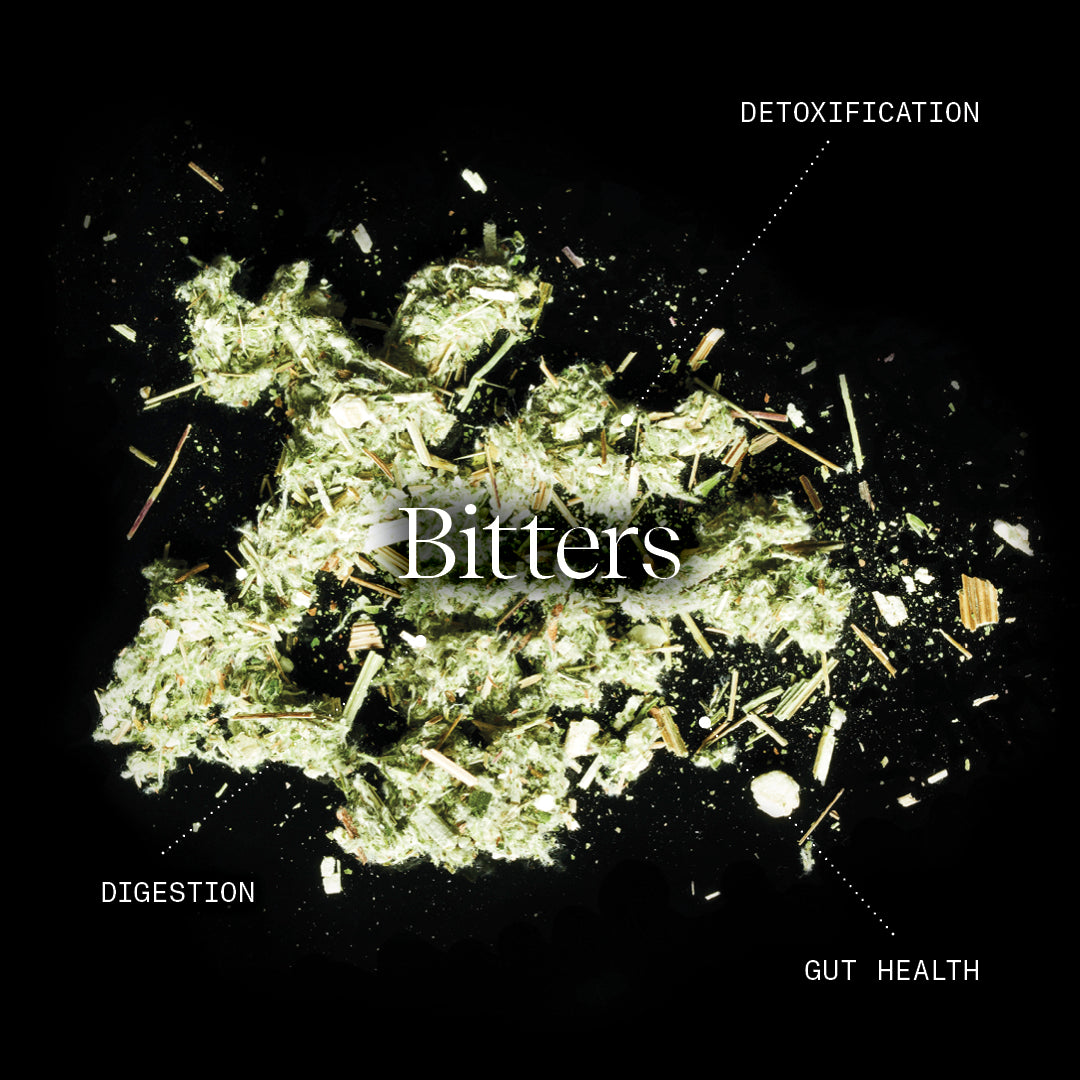If you’re keen on tastes that are sweet and salty, don’t overlook – or avoid – bitterness. In herbalism, Traditional Chinese Medicine , and modern wellness science, the bitter taste holds a sacred place. It's not just a flavor—it's a function.
Bitters are derived from plants with a distinctly sharp, bitter flavor—think gentian root, wormwood, or dandelion. They’re prepared by infusing roots, bark, fruit, seeds, or leaves in alcohol (typically called “tinctures”)—and have been used for centuries in medicinal systems around the world. They’re known for one thing above all: supporting digestion and a healthy gut.
Keep reading to explore the top health benefits of bitters, the most revered bitter herbs, and how to incorporate bitters into your daily routine.
What is the science behind bitters?

Recent research confirms what herbalists have long practiced. Bitter taste receptors (known as T2Rs) are found not only in the mouth but also in the stomach, intestines, pancreas, and even lungs. When activated, they can help:
- Regulate digestion and gut motility
- Support respiratory defense, and
- Communicate with the brain through the vagus nerve.
This gut-brain connection may be one reason why bitters are sometimes described as calming or grounding—especially when consumed as part of a mindful ritual.
Here are the top 5 health benefits of bitters
1. Improved Digestion
Bitters stimulate the taste receptors on the tongue, which signal the digestive system to increase the production of saliva. This kicks off the body’s digestive process, increasing the production of stomach acid, gastric juices, and enzymes which can improve digestion, reduce bloating, and support nutrient absorption.

2. Blood Sugar Regulation
Some bitters (bitter melon and gentian) may help balance blood sugar levels by slowing down gastric emptying, improving insulin sensitivity.

3. Liver Support and Detoxification
Many bitters (e.g., dandelion root, milk thistle, gentian) contain compounds that support liver health by encouraging and enhancing bile flow, supporting the liver’s natural detoxification process.
4. Appetite Regulation
Bitters can help regulate appetite by reducing overeating through increased feelings of fullness, but the science behind it isn’t so simple and has mixed results. Studies have reported that bitters might “participate in the control of food intake through the activation of gut–brain neural pathways.” Meaning that bitters might be able to diminish the desire to keep eating; however, a recent study from 2022 debated this conclusion: in evaluating twelve studies that measured bitters and food intake, “four of these found bitter administration decreased food intake and eight did not.”
5. Gut Health and Microbiome Support
Bitters may promote a healthy gut microbiome by reducing harmful bacteria, enhancing digestion and elimination, supporting the integrity of the gut lining.

What are the most common or revered bitter herbs?
The Cleveland Health Clinic lists the top bitter herbs as artichoke leaf, bitter melon, burdock root, dandelion, gentian root, licorice root, and wormwood. However, there are plenty more bitter herbs and roots that have been used for years throughout herbalism and Eastern Medicine.
While bitters are still common in Traditional Chinese Medicine, they haven’t been as popular in many western nations. Modern palates are dominated by sweet, salty, and umami – since bitter flavors have been bred out of vegetables to make them more palatable, we’ve lost many naturally-occuring bitter tastes. Additionally, with more solutions for indigestion, GERD, or heartburn prevalent in our pharmacies today, the natural apothecary digestives have faded from view.
But all is not lost. There is a market surge in bitters today. Craft cocktail bars have helped reintroduce bitters for flavor in both alcoholic and non-alcoholic beverages, and bitters are common in health food stores and wellness brands.
Incorporate bitters into your daily routine

Bitters have long played a role in classic cocktails such as Negronis and Old Fashioneds. In the “spirit” of those flavor profiles, Rasāsvāda's Black Ginger is the most bitter of the trio, crafted with ingredients such as burdock root, chicory root, dandelion root, cinchona bark, as well as reishi mushroom, Angelica Sinensis (Dong Quai) and Angelica Archangelica. Made from 100% plants with 0% preservatives.
What it tastes like: Bold, bittersweet, and deeply layered—Black Ginger combines earthy bitterness, warming spice, and roasted chicory with a rich, toasty depth reminiscent of dark coffee.
How to use: Sip it neat, mix it into cocktails, or add it to your coffee or a spritzer.
Key Takeaways
Bitters play a crucial role in supporting digestive function, liver detoxification, blood sugar regulation, and appetite control. By activating bitter taste receptors throughout the body, they help initiate key physiological responses that enhance nutrient absorption and metabolic balance. Whether taken before meals or as part of a wellness ritual, bitters offer a simple, natural way to support the body’s core systems.
Keep in mind: To get the full health benefits, bitters should be tasted (not swallowed in capsule form), as the bitter receptors in your mouth are key to triggering the digestive reflexes. This makes Rasāsvāda the perfect solution for bitters inclusion.
FAQs
100% plants. 0% preservatives.
Sources
The Basics Of Bitters - Science Friday
Bitters Market Outlook & Forecast Report 2024–2032
Bitters: Time for a New Paradigm - PMC (NIH)
Cleveland Health Clinic: Digestive Bitters, dandelion root, and milk thistle.
Digestive Benefits of Bitters, According To A Gut Health Dietitian
Enteroendocrine cells: a site of ‘taste’ in gastrointestinal chemosensing - PMC (NIH)






